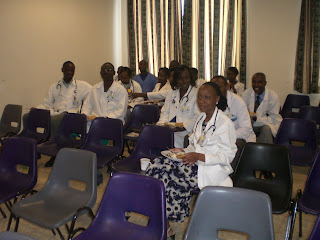
Tenwek Hospital, located in rural Kenya, is a teaching hospital, training interns as well as Family Medicine and Surgical residents. It is associated with Moi Medical School; however, the school is several hours away. There are actually several similarities between Tenwek and where I did my Family Medicine Residency in Springfield, Missouri. Cox hospital, located in rural Southwest Missouri, is home to a Family Medicine program. There is no medical school in Springfield, although we have ties to the University of Missouri in Columbia, several hours away.
A lot of similarities can be found between my medical education and that of the Kenyans training at Tenwek, but there are many differences as well. A Kenyan goes to primary, secondary, and then High School. These are not government sponsored, and all have fees associated with them. Before pursuing higher education, a Kenyan is required to take a year or two off, presumably to work and gain some broader experience. Then based on grades and test scores, they may qualify to enter medical school. This is a 5- or 6-year program, depending on the school. Then they get posted by the government to a hospital to do an internship. Kenyan physicians are called Medical Officers. There is also another form of healthcare professional training called Clinical Officers (think Physician Assistants). Tenwek currently takes 16 interns a year (a mix of M.O. and C.O. interns). These recent Med School graduates rotate in four specialties (Surgery, Peds, OB, and Medicine) for three months at a time. Here are some of the interns at a recent didactic lecture.

After internship, an M.O. will then usually work as a generalist in a district hospital. After two years of service, an M.O. is then eligible to apply to a residency, if they so desire. Tenwek has two residency programs, Family Medicine and General Surgery. Tenwek has graduated two Family Physician consultants (read "attendings"), and there are two FM residents currently in their first year of residency here. It is a three-year program, sponsored through Moi University, and includes full-scope training, including surgery. One of the recent graduates is now the Medical Superintendent at a local district hospital, essentially straight out of residency.
This adds a whole new dimension to what can be done with medical missions. It is one thing for an American doctor to travel abroad and see patients. But when one gets involved in education, the work of one physician can be multiplied through the interns and residents to have an even larger impact on the health of that country. For more on how this is being done in Kenya, check out the Infa-Med website.
There are multiple opportunities for education at Tenwek. The many physicians and surgeons that have visited Tenwek over the years have led to the development of a rather impressive medical library, so interns can read up on virtually any topic. Of course, there are always teachable moments while rounding on the wards. And there are several didactic sessions scheduled throughout the week, including a daily morning report and various lectures over the lunch hour.

This week I presented a lunch-time lecture on Hemostasis and Thrombosis. I tried to balance the lecture between teaching them the labs, tests, and treatments that are ideal and based on the best evidence, and the diagnostic and treatment difficulties they face in this resource-limited setting. Diagnosing DVT or PE, for example, with no D-dimer, no color-flow doppler, no CT scan (or even V/Q), is quite challenging.

I have really enjoyed the opportunity to be involved in education while I have been here, which is something I am passionate about. While it will be hard for me to leave in just a couple weeks now, I look forward to bringing this experience back to Springfield with me when I join the faculty at the Cox Family Medicine Residency.



No comments:
Post a Comment